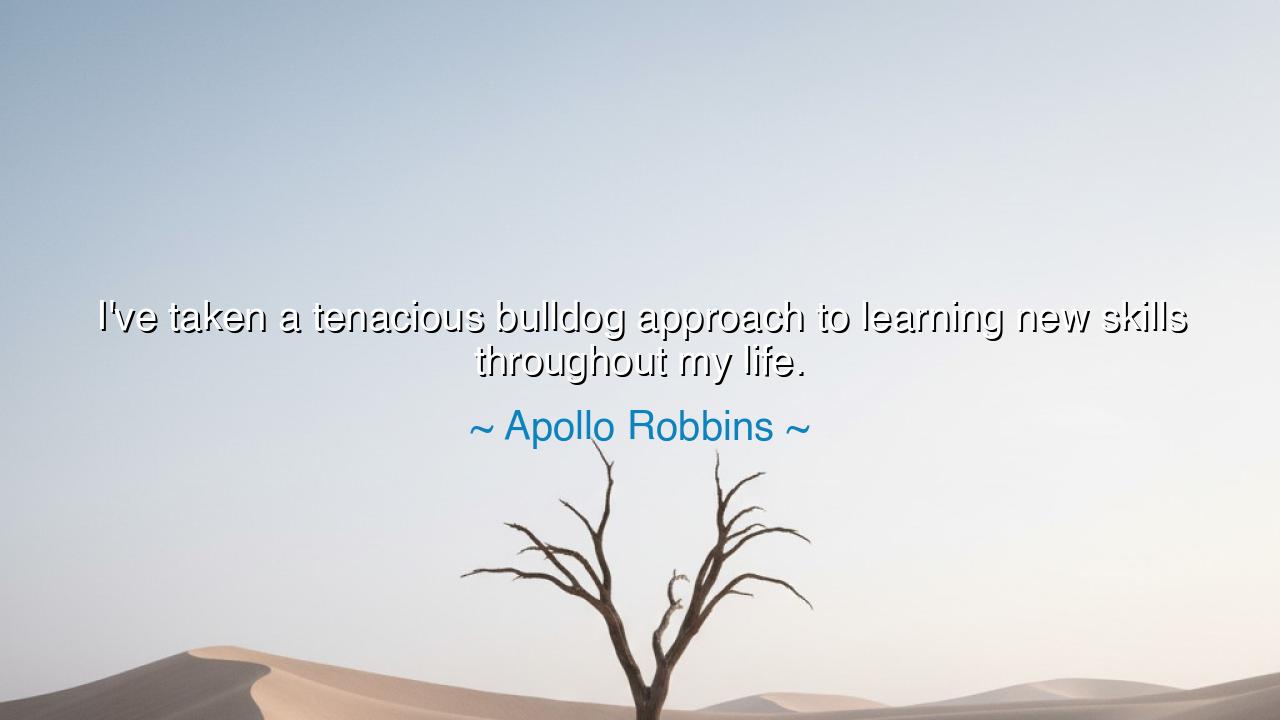
I've taken a tenacious bulldog approach to learning new skills






In the resolute words of Apollo Robbins, master of misdirection and student of perception, we hear a declaration forged in persistence: “I’ve taken a tenacious bulldog approach to learning new skills throughout my life.” Though simple in phrasing, this statement reveals a philosophy of mastery, a creed that belongs not only to performers or craftsmen, but to all who would rise above mediocrity. Robbins, known as “the gentleman thief,” built his art not through trickery alone, but through an unyielding devotion to understanding — of people, movement, and the human mind. His bulldog approach speaks of stubbornness in its noblest form: the refusal to let go until knowledge yields its secrets.
To the ancients, such tenacity was the mark of the wise. The philosopher who pursued truth did not dabble — he grappled. He wrestled with thought as Jacob wrestled with the angel, refusing to release it until it blessed him with revelation. The craftsman of old, the poet, the warrior — all knew that mastery demands not talent alone, but unyielding persistence, the willingness to return again and again to the same problem, the same failure, until it breaks. Robbins’s words echo this timeless truth: that discipline, not destiny, shapes the greatness of one’s art.
When he calls it a “bulldog approach,” he conjures an image both fierce and humble — the creature that grips and never lets go. There is no glamour in such persistence, no applause in the hours of repetition and correction, but this is the heart of creation. Each new skill begins as chaos, each attempt a small humiliation, but through patience and ferocity of focus, order is carved out of uncertainty. Apollo Robbins did not master sleight of hand by chance; he dissected movement, emotion, and timing until his body spoke the language of illusion fluently. His art became science; his science became intuition — and his intuition, at last, became beauty.
History remembers another who lived by this same creed: Thomas Edison, who once said, “Genius is one percent inspiration and ninety-nine percent perspiration.” Like Robbins, Edison attacked learning as a hunter stalks his prey. He failed over a thousand times before perfecting the light bulb, yet in his own words, he did not fail — he merely found “a thousand ways that didn’t work.” It was not brilliance alone that made him a legend, but his dogged perseverance, his bulldog grip upon his vision. The world was lit, not by luck, but by stubbornness made holy.
To learn in this way is not to rush toward mastery but to surrender to the long road. True students — the kind Robbins describes — do not fear repetition or difficulty. They know that frustration is the gatekeeper of understanding. The mind must be stretched, the ego broken, before new skill can take root. The tenacious learner becomes like the blacksmith’s forge — heated, hammered, and hardened, until failure can no longer bend them. Such endurance transforms learning from mere acquisition into transformation of the self.
Yet this path is not easy, and that is why so few walk it. In an age of speed and distraction, patience is the rarest virtue. We want to possess skill without becoming skilled; we want success without struggle. Robbins’s creed calls us back to the discipline of the ancients — to the art of focus. To take the bulldog approach is to decide that nothing worth knowing will come cheaply, and nothing learned quickly will last. It is to replace fleeting motivation with steady devotion.
So, my children of effort and seeking, let this be your lesson: when you take up a new craft, do so with the heart of the bulldog. Bite deeply into your goal and refuse to let go. Practice until the mind grows quiet and the hands begin to understand on their own. Do not flee from difficulty; chase it. Do not despise repetition; it is the rhythm by which mastery sings.
Thus, let Apollo Robbins’s wisdom guide your days: “I’ve taken a tenacious bulldog approach to learning new skills throughout my life.” Let it remind you that greatness is not born in comfort, but in persistence — that the path to excellence is long, unglamorous, and glorious all the same. Hold on, and in time, what once resisted will yield — and what you have learned will no longer be a skill, but a part of who you are.






AAdministratorAdministrator
Welcome, honored guests. Please leave a comment, we will respond soon